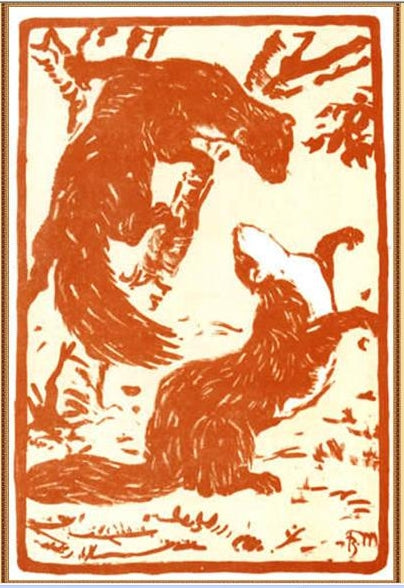Description
The painting "Playing the weasels" (1909) by Franz Marc, one of the most outstanding figures of German expressionism, offers a unique opportunity to explore not only its technique, but also the symbolism that underlies its representation of the animal world. In this work, Marc captures the essence of wildlife through the vibrant and emotional representation of the weasels, thus offering a comment on nature and interaction between human being and animals.
When observing the composition, a dynamic disposition of the figures can be noted in an environment that evokes both a sense of movement and harmony. The weasels are portrayed in playful poses, interacting with each other in a field of bright and contrasting colors. Marc uses fluid lines and simplified forms, characteristics of the style that he would develop throughout his career. This approach not only highlights the dynamism of creatures, but also establishes an emotional connection with the viewer.
The use of color in "Playing the weapses" is essential for the interpretation of the work. Marc, known for his color theory, uses a rich and saturated palette of tones that evoke nature: vibrant green, luminous yellow and intense red. Each color seems to be loaded with meaning; For example, yellow in this painting can be interpreted as a symbol of joy and energy, while green can represent natural life and wild. This choice of colors is not merely aesthetic, but reflects Marc's search for expressing the spiritual essence of animals and their surroundings.
The main characters of the work, the weasels, are not only animated beings in a simple game; They are representations of freedom and the purity of animal existence. In Marc's vision, these animals have an intrinsic connection with nature that contrasts with the growing industrialization and the loss of connection with the natural world that characterized Europe of their time. This idea is a recurring theme in Marc's art, which often sought to capture harmonic coexistence between man and nature.
"Playing the weapses" can also be seen as a precursor to the modernist approach that would later be consolidated in the art of the twentieth century. Simplification of forms and the use of color as a means of emotional expression anticipate subsequent movements, such as Fauvism and Cubism. Franz Marc, through his works, is established as a pioneer in the search for new ways to represent reality, and this piece is a testimony of his artistic vision.
In the context of Marc's legacy, "playing comadrejas" resonates within his series of works that explore the relationship between animals and their surroundings, an interest that marked their production and is based on their struggle to find a visual language that communicates his fascination with natural life. Although the work is not as known as "the destiny of animals", it is equally important to understand their evolution as an artist and their conceptual development.
In conclusion, "Playing the websing" of Franz Marc is a work that not only displays his technical mastery and his use of color, but also opens a dialogue about the spirituality of animal life and his relationship with the human being. When contemplating this painting, we are invited to reflect on our own connection with the natural world and the importance of preserving the beauty of the wild at a time when it is threatened. Marc's work, in his search to capture the essence of life and nature, remains a source of inspiration and a call to the appreciation of what surrounds us.
KUADROS ©, a famous paint on your wall.
Hand-made oil painting reproductions, with the quality of professional artists and the distinctive seal of KUADROS ©.
Art reproduction service with satisfaction guarantee. If you are not completely satisfied with the replica of your painting, we refund your money 100%.

